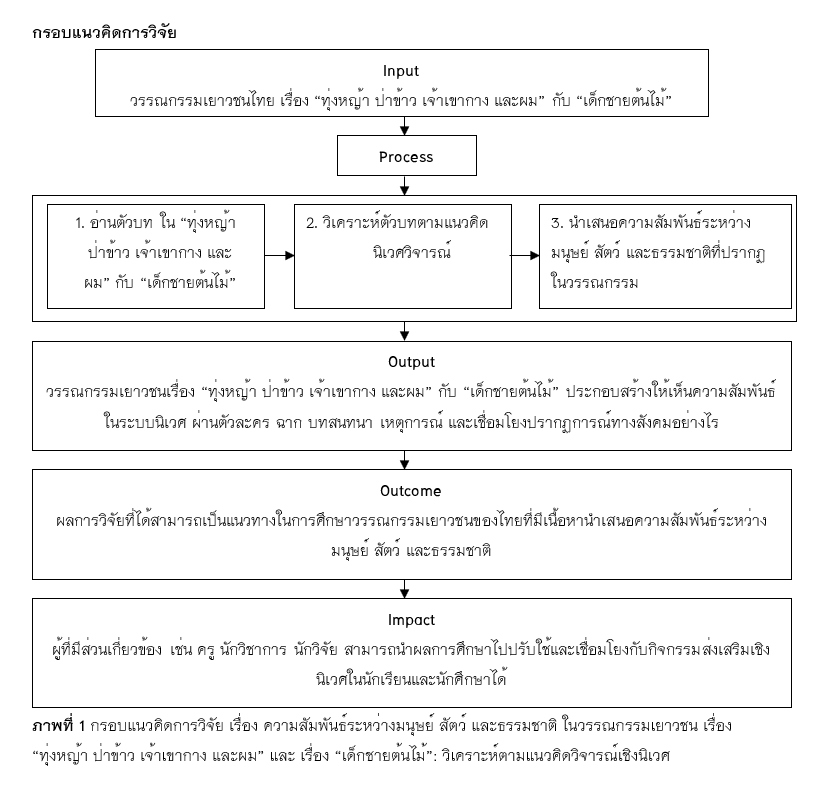Relations of Humans, Animals, and Natures in Youth Literatures Titled Tungya Phakhao Chaokhaogang Lae Phom and Titled Dekchai Tonmai: Analysis with Ecocriticism Approach
Main Article Content
Abstract
This article aimed to analyze the relations of humans, animals, and nature appeared in youth literatures entitled ‘Thung Ya Pa Khao Chao Khao Kang Lae Phom’ and ‘Dekchai Tonmai’. This was qualitative research. The samples, ‘Thung Ya Pa Khao Chao Khao Kang Lae Phom’ and ‘Dekchai Tonmai’ youth literatures, were analyzed with Ecocriticism by Cheryll Glotfelty. The results of the study found that Thung Ya Pa Khao Chao Khao Kang Lae Phom’ and ‘Dekchai Tonmai’ constructed the relations of humans, animals, and nature in 3 topics were: 1) the interdependence among humans, animals, and nature by creating characters with a sense of environmental conservation, 2) the relations of humans, animals, and nature showed the destruction of the environment and animals by humans with creating characters who destroyed nature, and 3) the presentation of natural cruelty punishing humans who destroyed nature by describing the punishment of humans that nature took in return, for example, storms, floods, and fires occurred unexpectedly. Youth literature therefore was a tool for planting awareness and instilling ecological consciousness through the main characters, setting, events, and situations pushing the main characters to solve problems about nature and environment.
Downloads
Article Details

This work is licensed under a Creative Commons Attribution-NonCommercial-NoDerivatives 4.0 International License.
The articles published are copyrighted by the Graduate School, Chiang Mai Rajabhat University.
The opinions expressed in each article of this academic journal are solely those of the individual authors and do not reflect the views of Chiang Mai Rajabhat University or its faculty members. The responsibility for the content of each article rests entirely with the respective authors. In the event of any errors, the authors alone are responsible for their own articles.
References
Boonchai, K. (2023a). Eco-culture from ecological anthropology to the Thai environmental movement. Retrieved from https://www.sac.or.th/portal/th/article/detail/517 [In Thai]
Boonchai, K. (2023b). Policy turning point in ecological protection and environmental democracy. Retrieved from https://www.sac.or.th/portal/th/article/detail/461 [In Thai]
Chanthamat, T. and Sangkhaphanthanon, T. (2019). Representation of nature and environment with dynamic of ecological consciousness in Thai novels between B.E. 2475-2556 (1932-2013). Journal of MCU Peace Studies, 7(1), 213-223. [In Thai]
Ekarun. (Pseud.). (2020). Tungya Phakhao Chaokhaogang lae Phom. Bangkok: Nanmeebooks. [In Thai]
Glotfelty, C. (1996). The ecocriticism reader: Landmarks in literary ecology. Athens: University of Georgia Press.
Gerdpimai, W. (2023). “Ngu Ngon Thong” Tale: The study of the relationship between man and nature based on the Ecocriticism theory. Mangrai Saan Journal, 11(1), 91-107. [In Thai]
Kaewthankham, C. (2018). Repressentation ecological self in poetry “Plant flowers on the hill”. Journal of Social Sciences and Humanities Research in Asia, 24(3), 223-237. [In Thai]
Keawsi, P., Nakkaew, P., Choojanthong, R., Viriyasattha, N., Dinlansagoon, M., and Jeennoon, P. (2021). Status of literature research using the concept of ecological conscience between 1994–2020. In The 12th Hatyai National and International Conference (pp. 418-433). Hatyai: Hatyai University. [In Thai]
Kokhao, W. (2021). Environmental policy and management / Soparat Jarusombat. Retrieved from https://sac.or.th/portal/th/article/detail/290 [In Thai]
Mitrapiyanurak, S. (2020). Dekchai Tonmai. (2nd ed.). Bangkok: Nanmeebooks. [In Thai]
Naijarun, k. (2021). From literature to raising ecological consciousness among youths: A case study for Wankaeo Youth Novel Award. Phranakhon Rajabhat Research Journal (Humanities and Social Sciences), 16(1), 71-84. [In Thai]
Ngaochaiphum, K., Biadkhuntod, J., Papor, P., Promkuntha, P., and Chompuphra, P. (2018). The study of conception ana strategies for presenting in the youth literature of a little Garuda. Panya, 25(2), 18-27. [In Thai]
Phuangsombat, N. (2021). The use of morality in literature as a guideline to Encourage youth’s behavior. Wiwitwannasan, 5(3), 171-201. [In Thai]
Pradittatsanee, D. (2016). Examining environmental issues through the lens of contemporary American literature. Bangkok: Copyright of Chulalongkorn University Press. [In Thai]
Sangkhaphanthanon, T. (2013). Ecocriticism in Thai literature. Bangkok: Nakhon. [In Thai]
Sangkhaphanthanon, T. (2023). Ecolinguistics: New ways of meaning. Aksara Pibul Journal, 4(2), 121-150. [In Thai]
Sangkhaphanthanon, T. and Sangkhaphanthanon, L. (2018). Green folklore: Folklore studies, in the View of Ecocriticism. Journal of Social Sciences and Humanities Research in Asia, 24(3), 3-30. [In Thai]
Singthong, U. Mookham, T. Munying, W. and Waranusant, P. (2023). The relationship of human and nature in Kamin Kamani’s literary works: Discourse analysis. Mangrai Saan Journal, 11(2), 99-116. [In Thai]
Wirojchoochut, M. (2022). Importance of multicultural literature for young Thai readers. Thammasat Journal, 41(2), 27-43. [In Thai]
Wirawan, W. (2019). Nature as a theme in the young adult fiction, Baan Chai Thung. Journal of Humanities and Social Sciences, 11(1), 83-108. [In Thai]


